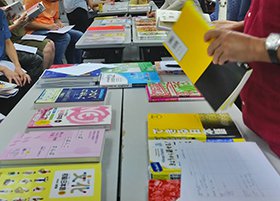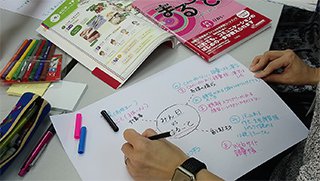Creating Venues for Sharing Learning and Realization
The Society of Japanese Language Education Hong Kong
SAITO Makoto
The duties of the Japanese-Language Specialists (hereinafter “Specialists”) who are dispatched to Hong Kong are varied, but our core work could be described as holding training and workshops for teachers of the Japanese language in Hong Kong and Macau, visiting Japanese-language educational institutions, and helping teachers to update their skills and form networks with other teachers. In my fiscal 2019 report, I talked about the “Intensive Training Program for Japanese-Language Teachers (hereinafter the “Training for Teachers)” and my first workshop in Macau, but I am also holding workshops at various other opportunities. This time I would like to introduce a workshop I held with the goal of sharing “learning and realization” among participants, as one of the workshops I held in fiscal 2019–2020.
1. “Easy Japanese Language” Workshop (April 2019)
In this workshop, the participants worked on activities that demonstrated an awareness of the Japanese language as a multicultural communication tool, with “What are easy-to-understand expressions that are communicable to anyone?” as the theme. The act of considering what expressions are easy to understand and searching for more appropriate words is difficult to do without being conscious of the Japanese we normally use. The participants were not only Japanese-language teachers – they included ordinary Japanese nationals living in Hong Kong, and some individuals for whom Japanese was not their mother tongue, and they engaged in the tasks together while holding an animated discussion. At a later date, I was also approached by the Hong Kong Japanese Chamber of Commerce & Industry, and held the workshop at the organization’s regular study group as well. Based on surveys of the participants, it was possible to conclude that the workshops provided opportunities to realize the importance and difficulty of conveying information in an easy-to-understand manner when communicating in “the Japanese language,” something native Japanese speakers are not normally aware of.

The “Japanese-Language Textbook Cafe”
2. Let’s Talk Together at the “Japanese-Language Textbook Cafe” (October 2019)
In this project, I lined up over 50 Japanese-language textbooks that I own as books for my work as a Specialist on desks at the Society of Japanese Language Education Hong Kong (hereinafter the “Society”), where I am dispatched, and the participants browsed through them. There are bookshops in Hong Kong that carry Japanese-language textbooks published in Japan, but they offer a limited range of textbooks that are used at the front lines of education. The 26 participants included senior secondary school students and future Japanese-language teachers. Each participant picked up and compared two or three books, and then shared information and things they had noticed about them in groups. When I surveyed the participants, some said that they had learned and noticed things about the textbooks, but a large number also praised the exchange and sharing that took place at the event, and there was a comment that “Sharing in groups meant I was able to learn information about textbooks that I might not look at myself, which was good.”

During the group work at the fiscal 2019–2020 Training for Teachers
The Japanese-language teachers who work in the location where I am dispatched have a very large number of class hours every day, and many have their hands full with their day-to-day classes. One role of the Specialists here is to provide opportunities for teachers to brush-up their skills and form networks, as I mentioned earlier.
There are not so many seminars, workshops or other training opportunities in Hong Kong. Entering 2020, as a result of an increase in online training, it has become possible for teachers in other countries and regions to participate in online workshops hosted by Specialists dispatched to Hong Kong, which I suspect has broadened the horizons of the teachers here as well.
These workshops are also serving as opportunities to transmit Hong Kong’s Japanese-language education overseas. It is my hope that the things that are “learnt” and “realized” in that the course of process will be re-injected into day-to-day classes, and thus enhance the Japanese-language education of tomorrow in Hong Kong and Macau.
- What We Do Top
- Arts and Cultural Exchange [Culture]
- Japanese-Language Education Overseas [Language]
- Japanese-Language Education Overseas [Language] Top
- Learn Japanese-language
- Teach Japanese-language
- Take Japanese-Language Test
- Know about Japanese-language education abroad
- The Japanese-Language Institute, Urawa
- The Japanese-Language Institute, Kansai
- Japanese-Language Programs for Foreign Specified Skilled Worker Candidates
- Japanese Language Education for Japanese Children Resident Overseas and for the Descendants of Migrants
- Archives
- Japanese Studies and Global Partnerships [Dialogue]
- JF digital collection
- Other Programs / Programs to Commemorate Exchange Year
- Awards and Prizes
- Publications
